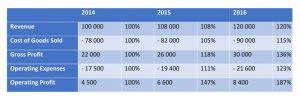
Accurate bookkeeping is a baseline requirement for all business planning and operations. This includes tracking and categorizing income and expenses, inventory management, and reviewing balance sheets. Tax management can be complicated, and mistakes in filing or interpreting the tax code can have serious consequences for business owners. That’s why tax management (including both tax planning and preparation) is a core service of many accounting firms. They use various methods to record and analyze budgets, expenses, and revenue and produce financial records based on the data they have analyzed. Their work is crucial for predicting the financial impact of any recommended change or potential future event on a business.
- For instance, an accountant based in New York City that specializes in large, enterprise eCommerce stores will have a much higher fee than a generalist accountant based in the Midwest.
- A specialized accountant or accounting firm can make all the difference in the growth of your business by helping you with your projections and finances.
- Because different banks offer different benefits for business owners, the offers and maintenance fees also differ from one bank to another.
- With this software, you can handle your company’s invoices, reconcile bank statements, and manage spend control all in one place.
- It’s also a good idea to get all of the licenses and permits you’ll need to operate legally.
- However, these payment gateways won’t work for all eCommerce businesses.
- Managing these tax obligations can be time-consuming and stressful, especially if you’re unsure how much you owe or to whom you owe taxes.
Granular knowledge of the industry – Ecommerce accountants quite literally make it their business to stay on top of the ins and outs of the industry – at least where matters of finance are concerned. This means that they can make sure you’re taking advantage of all possible tax relief opportunities and keep you up to date with any new or refreshed regulations. They’ll also be able to use their skills and experience to simplify and streamline the process when it comes to submitting your Company Tax Return and VAT Return each year. Accounting is a profession that, in many ways, has stayed the same for well over a century.
Essential financial metrics for accounting for ecommerce
A large part of constructing these foundations for your business comes back to accounting and financial management, which provide stability and steer as you evolve. Yes, you can open a business savings account but there are some things you’ll need to think about before you do. Firstly, business savings accounts tend to have much lower interest rates than a personal savings account. So, for a sole trader, it’s better to save through a personal bank account.
These errors can lead to inaccurate financial reports and potentially costly financial decisions. Use cash on hand for immediate needs like buying supplies, and use accruals to prepare for future demand and budgeting. This gives a more accurate picture of your business’s financial health over the long term, especially if you ecommerce accountant deal with credit transactions, inventory, and assets. Accrual accounting records revenues and expenses when they are earned or incurred, regardless of when the cash is actually received or paid. Regular financial analysis enables you to understand your business’s financial performance and make informed business decisions.
Key Metric #4: Operating Expenses
You can move from getting advice based on generalities to getting advice based on your particular position within your business and your particular growth strategies. In fact, here are some of the biggest Xero setup mistakes that we see business owners make when setting up their chart of accounts. This is a mistake in our experience since the default isn’t configured with an ecommerce business in mind. https://www.bookstime.com/articles/how-to-find-good-accounting-firms-for-startups You should consult with an ecommerce accountant to help you get everything set up. As part of this process, you’ll also have dedicated resources that are helping provide a clear understanding of profitability – be it an accountant, bookkeeper, and/or VAs. If you have a system for recording all transactions and expenses, you can get clear insights into how your business is operating at any time.
In addition, payroll taxes – along with student loans – are one of the few things that can’t be discharged if you file for bankruptcy. One of the most common mistakes that we see eCommerce companies make is hiring accountants and bookkeepers too late. Bring on an experienced bookkeeper early to avoid tax and payroll complications. Because there is so much complexity, we recommend using sales tax software like Zamp or an automated tax advisor, like TaxValet, to streamline this process.
Inventory management can be complex
Many entrepreneurs underestimate these obstacles and end up having to close up shop for good. While a brick-and-mortar store can get away with a simple cash-based accounting system, E-commerce presents a whole host of issues in accounting and finance thanks to the digital nature of the industry. But once you get past that, this accounting system starts making more sense. Since it provides a more realistic representation of your business income every month. Plus it allows making more accurate financial projections as you take into account your present and future financial obligations. However, this accounting method isn’t the best choice for larger ecommerce operations since it does not recognize future account receivables and accounts payables.

